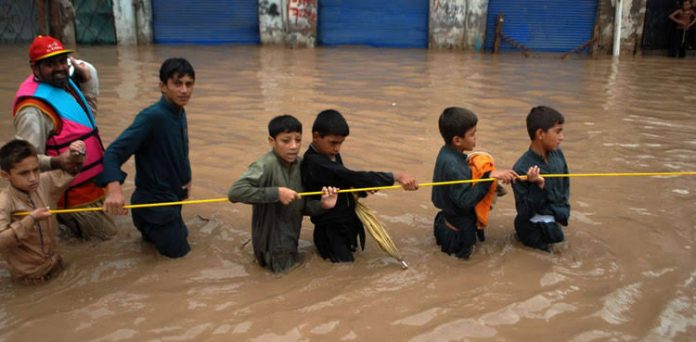The recent heavy rainfall in Balochistan’s Gwadar and Kech districts has triggered severe damages, disrupting normal life and traffic along the Coastal Highway. The downpour, exceeding 160mm in just 12 hours, overwhelmed the region’s infrastructure, leading to flooding in both residential and commercial areas. This inundation not only posed a threat to lives and property but also washed away sections of the vital Coastal Highway, which links the strategic Gwadar port with Karachi, a major economic hub.
Recognizing the gravity of the situation, the district administration swiftly declared an emergency in rain-affected areas of Gwadar. To bolster rescue and relief efforts, paramilitary forces were called in to assist local authorities. The prompt response aimed to mitigate the immediate impact of the disaster and provide support to affected communities.
The Deputy Commissioner of Gwadar, accompanied by other officials, took proactive steps by visiting the affected areas to oversee rescue operations firsthand. This hands-on approach underscores the commitment of local authorities to address the crisis efficiently and minimize further harm.
In addition to Gwadar, Jiwani bore the brunt of the relentless rains, with three dams succumbing to the deluge, exacerbating the flooding. The situation was further compounded as boats were swept away into the sea, amplifying the challenges faced by residents and emergency responders alike. The catastrophic failure of these dams underscores the vulnerability of infrastructure in the face of extreme weather events and highlights the urgent need for resilient design and maintenance protocols.
The severity of the rainfall-induced havoc was exacerbated by the Meteorological Office’s prior warnings about the impending weather system. Predictions of rain, thunderstorms, and snowfall across various parts of Balochistan served as crucial early alerts, enabling authorities to mobilize resources and prepare communities for the imminent threat.
The recent heavy rainfall in Balochistan has inflicted widespread devastation, particularly in Gwadar and Jiwani. The coordinated response efforts by local authorities and the assistance provided by paramilitary forces are crucial in mitigating the immediate impact of the disaster and facilitating the recovery process. However, the incident underscores the importance of proactive disaster preparedness measures and investments in resilient infrastructure to mitigate the risks posed by extreme weather events in the future.


